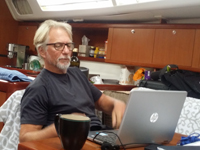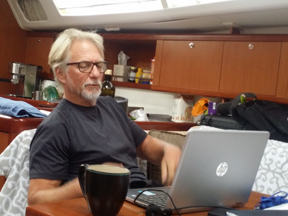
Dicks commentary bug

When I joined the American Veterinary Medical Association staff in 2013 as chief economist, I was charged with improving the financial performance of veterinary practices and veterinary markets overall. AVMA leadership thought that the veterinary profession was sick and needed help to recover.
I assumed that most of the problem was caused by the deep recession of 2007-09. Within the first year of assessing the situation, I could see the recession's major impact on the cost of education, labor markets and the market for veterinary services. But that wasn't the whole of it. Even with the expanding economy, I found that every major veterinary market faced significant and growing challenges.
From education to employment to clinical practice, many of the profession’s fundamental systems, business models and practices — its customs and culture — no longer meet the needs or expectations of veterinarians, clients or the communities they serve.
Veterinarians experience many and persistent stresses. In practice, often there are differences of opinion between veterinarians over what is appropriate patient care, appropriate pricing and how best to treat patients and clients — factors that contribute to ethical stress (stress related to concepts of right and wrong). Practitioners experience emotional stress (stress stemming from empathy for animals and people) when pet owners are unwilling or unable to follow recommendations for patient care and treatment. Veterinarians want the best for their patients and are not able to provide it if the client is unable or unwilling to pay. These ongoing stressors, in combination with financial stress caused by high educational debt relative to income, makes many veterinarians, especially younger ones, unhappy in their livelihood.
Michael Dicks informal 288

Photo by Grant Delbert Venerable III
Author Michael Dicks writes from aboard his sailboat. Retired as chief economist of the American Veterinary Medical Association, he recently embarked on a journey from Erie, Pennsylvania, bound for Florida.
The unhappiness is evident in results from the Merck Animal Health Veterinary Wellbeing Study presented in 2018. The most provocative finding of the study may well be that fewer than half of veterinarians surveyed would recommend the profession to a friend or family member. Among those age 34 and younger, fewer than one-quarter endorsed the profession.
This finding should be of urgent concern to every veterinarian.
Veterinary medicine is at a crossroads. It can continue on the path it's traveled for decades, following long-established norms that worked once but that serve poorly in a rapidly changing business and socioeconomic environment. Or it can blaze a new path.
In “The Future of the Professions: How Technology Will Transform Human Experts,” authors Richard Susskind and Daniel Susskind write, “[P]rofessionalism has been the main way of institutionalizing expertise in industrialized societies.” That was before the advent of the World Wide Web. In the Information Age, the authors ask, “Why should the profession control the acquisition and application of information?”
The veterinary profession is an important social component of American life. Our physical and emotional involvement with domestic animals has grown rapidly in recent decades. At the same time, pet owners face constraints to providing the full care that animals need. Just as society and its needs are changing, so, too, veterinary medicine must change. The consequence of failing to change is irrelevance. And that, I trust, is not acceptable.
Letters

It is not too late to act, but time is short. Already, the profession missed an important opportunity that came when the AVMA Board of Directors established, along with the Veterinary Economics Division, a Veterinary Economics Strategy Committee (VESC). We developed a wealth of data analytics but the information did not, for the most part, reach veterinarians. For reasons I don't fully understand, the AVMA did not communicate the information to its membership — information that its members had paid for.
I will always feel some responsibility for this failure, in the same way that many veterinarians feel responsible for not being able to get animal owners to follow their care recommendations or, in some cases, to visit the veterinarian at all. Not only did the profession miss a game-changing opportunity, but as a long-time rancher and dog lover, I worry what the failure might mean to the future of animal agriculture and to my dogs' health care and wellness.
When I look back on my time learning about the profession and trying to support it, I can relate to some of the stress that veterinarians endure. I spent five years examining my patient, diagnosing problems and developing treatments. The job was professionally fulfilling but because nothing changed fundamentally (the client did not act on the evidence we identified or our recommendations), I saw that I was ineffective. I was frustrated (you might say emotionally or ethically stressed) when no one wanted to embrace key problem-solving strategies. That frustration eventually led me to retire from the role of chief economist to the profession.
The economics team that I directed was nothing short of exemplary. But every time we published the factors that were associated with a specific problem, some affected veterinarians lashed out in writing and in phone calls to AVMA leadership. The critics didn't want to hear their role in the problem. Even within AVMA headquarters, we met resistance from some staff to proposals we made, whether it was automating data-collection and -cleaning processes, or integrating our research with the membership division's college outreach, or any number of other ideas.
The economics team nevertheless persevered to help me better understand veterinary markets and the practice of veterinary medicine. The analytics provided by the team created a treasure trove of information that would improve the profession, if only its members would embrace it with the vigor they gave to the study of veterinary medicine.
The economics team analyzed the veterinary markets (education, employment and clinical practice), veterinary students, veterinarians and pet owners. We meticulously provided this research in the form of AVMA economic reports, an AVMA monthly online series called Exploring Economics, articles published in the trade magazine DVM360, and presentations at college campuses, conferences, meetings, in boardrooms and at associations. But, to apply the analogy once more, this effort was no different from a veterinarian's effort to share the importance of veterinary care with pet owners who don’t bring their pets to the veterinarian. The economics team offered information on problems and solutions, but our potential clients had to seek out the information, understand it, and then feel confident in implementing it to actually change behavior on a grand scale. In short, we had no effective means of building a relationship with our clients – no outreach strategy to help the profession change paths.
I don't blame veterinarians for the predicaments of their profession. Individuals are doing what they were trained to do. The profession is suffering from a well-known economic malady known as the fallacy of composition — individual actions when taken as a group result in adverse consequences. Most veterinarians simply have not been focused on the profession as a whole, or even on the health of their own practices, but rather on providing the best care they can to their patients.
Meanwhile, the world is changing in a way that has allowed others to rent seek (find profit opportunities) in the profession, and it does no good for veterinarians to blame others for rent-seeking behavior — this is what people do in a capitalist society. The new path that veterinarians must follow is the rent-seeking path, at the same time keeping an eye on service to the community (that they already are providing) and the overall impact of group decisions on the profession.
I realize that veterinarians are not economists and most don’t have the same enthusiasm for data analytics processes as do "data scientists." By the same token, animal owners are not veterinarians and may not have the same enthusiasm for pet health care. In both cases, the holder of the information must build a relationship with the potential recipient to ensure that the information is understood and acted on. Information without a relationship that facilitates its use won’t produce the desired results.
Question. Demand performance. Take action.
Throughout this series, my co-author Dr. Melissa Maddux and I have identified major problems and described some potential solutions. In closing, our most important point is that each member of the profession should ask and address the question "why?"
Dr. Link Welborn, past chair of the VESC and a man I consider a mentor and a friend, makes a practice of asking his clients, "Is your pet the best pet in the world?” His purpose is to assess the bond between the person and the animal and to set the stage for troubleshooting any issues that interfere with building the strongest bond possible. Similarly, I would ask every veterinarian to ask themselves: Is this the best profession in the world? If the answer isn’t a resounding yes, you know there's work to do.
Every veterinarian must get involved to put in place leadership that will act on the major problems. If individual veterinarians have solutions, there must be a process for conveying their ideas to leadership and disseminating the ideas to colleagues. Those in leadership must put away personal agendas and become champions for solutions.
It's imperative that each veterinarian demand performance — of clients, of colleagues, of product and service suppliers, of associations and of every other entity involved with the profession. If their performance isn’t up to your expectations, don’t continue the relationship merely because it is what you believe is expected of you. Ask why. If there is no answer or you find the answer unacceptable, demand accountability or end the relationship. Markets work well only when the price paid is equal to the value received.
Veterinary students need to be encouraged to question processes and practices: “Why are we doing it this way? Is there a less expensive way to do it? What is the difference in outcome?”
New graduates must be taught to ask prospective employers how profit is created in the practice; to ask for evidence that supports the practices employed; and to understand their role in the practice and the criteria by which they'll be evaluated. They must better understand how to align the needs of the patient and the needs of the client with their own needs — both financial and emotional.
Every veterinarian must demand an explanation for why things are done the way they're done. They need transparent processes through which they can review, evaluate and debate evidence that supports the way things are done. Most importantly, every organization that purports to serve veterinarians needs a process that enables its members' participation; a process that empowers members to vote with their feet and their pocketbooks.
It is time to determine the role of the future veterinarian and to redesign the educational process so that students can learn that role at a cost that is something less than 1½ times their starting incomes.
Accept that the demographics of animal owners and veterinarians is rapidly changing and develop veterinary labor markets that accommodate the needs of both.
Examine new business models for veterinary practices to provide preventive, curative and palliative care that is effective, accessible, affordable and meets the needs of the local community.
Above all, act. Choose one thing that you can do today, individually or as part of a team, that will help you answer yes, this is the best profession in the world.
Next: Responses from readers
About the author: Michael Dicks, PhD, established the veterinary economics division of the American Veterinary Medical Association in 2013 and was its director until 2018. Dicks earned a BS in biochemistry and animal science from California Polytechnic State University, taught chemistry as a Peace Corps volunteer in Kenya, then completed master's and doctoral degrees in agricultural economics at the University of Missouri.
He was employed by the U.S. Department of Agriculture Economic Research Service for five years before joining the faculty at Oklahoma State University, where he spent nearly 24 years prior to his stint at the AVMA. Today, Dicks works as a consultant in several capacities, including as data chief at Erupt LLC, a new company that offers data analytics and educational outreach to clients in the veterinary realm.